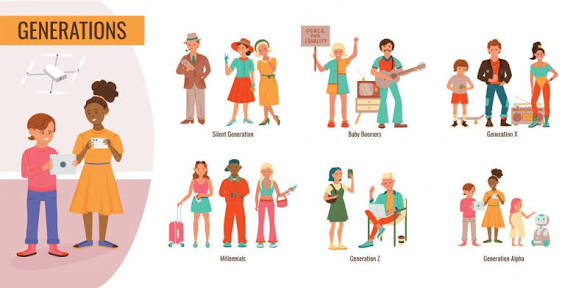
If you ask a teenager or even a 10-year-old today about their biggest stress, the answer often includes school, social media, or “not being good enough.” Gen Z (roughly born between 1997 and 2012) and Gen Alpha (2013 onwards) are living through a time where the digital world is almost inseparable from real life. This has changed the way they think, feel, and interact with others.
1. Living Online 24/7
Phones and tablets are part of daily life. While they keep young people connected, constant scrolling often brings anxiety, poor sleep, and shorter attention spans.
2. Social Media Comparison
For many teens, self-worth depends on likes, comments, or followers. Gen Z already feels this pressure, and Gen Alpha is starting even younger. The result? More stress, insecurity, and body image issues.
3. Growing Anxiety and Depression
Rates of anxiety and depression are rising among young people. Academic stress, economic worries, and uncertainty about the future all play a role.
4. Identity Questions
Today’s teens feel pressure to figure out “who they are” early—whether it’s about career goals, personal beliefs, or self-expression. While exploration is normal, the constant pressure can feel overwhelming.
5. Loneliness Despite Connection
Many Gen Z and Alpha kids have hundreds of online “friends,” yet still feel lonely. Digital chats can’t fully replace face-to-face friendships.
6. Pressure to Perform
School grades, university admissions, and job competition weigh heavily on Gen Z. Even Gen Alpha, still in primary school, faces structured schedules and high expectations.
7. Global Worries
Climate change, pandemics, wars, and financial struggles are part of their everyday awareness. While being informed is good, constant exposure creates stress and a sense of helplessness.
8. Struggling to Focus
With endless short videos and notifications, attention spans are shrinking. Teachers and parents already notice it in both Gen Z and Gen Alpha.
9. Shifts in Parenting
Many kids are growing up with helicopter parenting or heavy screen use as babysitting. This can limit problem-solving skills and resilience.
10. Mental Health Stigma
Gen Z is more open to talking about therapy or counseling than older generations, but stigma still lingers. For Gen Alpha, progress will depend on how families and schools prioritize mental health



You must be logged in to post a comment.